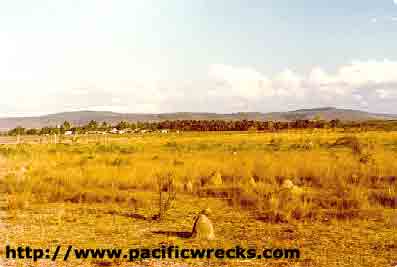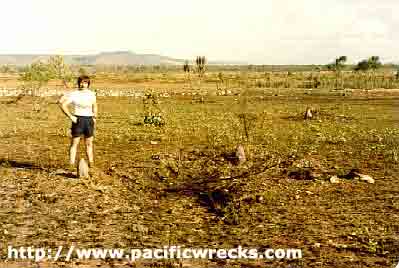|
|
|
|
| Missing In Action (MIA) | Prisoners Of War (POW) | Unexploded Ordnance (UXO) |
| Chronology | Locations | Aircraft | Ships | Submit Info | How You Can Help | Donate |
|
  Stan Gajda 1982 |
Location Lat 14° 17' 18S Long 126° 37' 55E Drysdale Airfield is located at an elevation of 29' above sea level at Drysdale (Kalumburu) in Western Australia in Australia. Also known as Drysdale Mission Airfield or Drysdale River Mission Landing Ground (Drysdale River Mission LG). Still in use today as Kalumburu Airport. Construction At the start of World War II, the Australian government built an airfield at this location with two runways that intersected at about 75 degree angle situated between Darwin to the northeast and Fremantle to the southwest. Wartime History During the Pacific War, used as a military airfield for the Royal Australian Air Force (RAAF) for patrol and refueling and later combat missions over the Netherlands East Indies (NEI). On December 2, 1942 the first mission from Drysdale Airfield was flown by Beaufighters of 31 Squadron RAAF attacked and destroyed enemy aircraft on Poeloeti Airfield (Penfui) near Koepang on Timor. Afterwards, used by RAAF aircraft to attack Japanese occupied Timor until Truscott Airfield was constructed. Afterwards, Drysdale remained in use supporting operations. After the force landing of B-24D "Shady Lady" 42-40369 on August 14, 1943, Drysdale was used by RAAF aircraft to support rescue operation and salvage efforts. Naming Honors On May 11, 1943 Drysdale Airfield was named "Thorold Strip" in honor of Spitfire A58-92 pilot Squadron Leader Thorold-Smith killed in action on March 15, 1943. Japanese missions against Kalumburu September 27, 1943 (JAAF / IJN) Twenty one Ki-48-II Lilys from the 75th Sentai took off from Koepang Airfield escorted by A6M Zeros from the 202 Kokutai took off from Penfui Airfield. Detected by radar, Darwin was notified and Spitfires from 452 Squadron took off to intercept, but failed to reach the area in time. Over the target, the Ki-48 made a 40° dive bombing attack against the Drysdale Airfield and Drysdale Mission, each dropping six 50 kg bombs and afterwards strafed the area. The Australians fired ineffective anti-aircraft fire at the attackers. The runway was hit and an ammunition storage hut was set on fire and destroyed. Five were killed on the Drysdale Mission. All of the Japanese planes returned safely, the last Japanese daylight bombing raid over Australia and last flight of Zeros over Australia. After the raid, eighty-six bomb craters were found in the area. Today, there area still a lot of bomb craters about and bomb fragments from this mission. Postwar In 1951, renamed Kalumburu Airport and management was administered by Kalumburu Aboriginal Corporation on behalf of the Kalumburu Community Council. Today Still in use today as Kalumburu Airport. Airport codes: ICAO: YKAL IATA: UBU. Stan Gajda adds: "There were still some RAAF buildings there when I was there last in 1982. Beaufighters, Wirraways, Spitfires, P-40s, Hudsons and B-25s used to operate out of there. B-25C "Mississippi Dream" N5-161 Abandoned at the airfield, scrapped in 1982 Bristol Beaufighter Mark XIc A19-144 Recovered by Robert Greinert and Dennis Baxter in the middle 1980s Bristol Beaufighter Mark XIc A19-148 Recovered by Robert Greinert and Dennis Baxter in the middle 1980s References Air Group 202's Final Escort Mission over Australia by Richard Dunn Oz@War Drysdale Mission Airfield, WA During WW2 Contribute
Information Last Updated
|
Map Fallingrain |
| Discussion Forum | Daily Updates | Reviews | Museums | Interviews & Oral Histories |
|